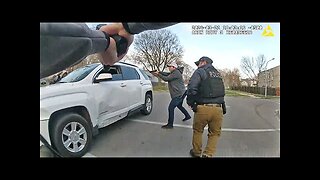Premium Only Content

Medical examiner says subway madman had drugs in system in Marine vet’s chokehold trial
11.15.2024
Dr. Cynthia Harris of the New York City Medical Examiner’s Office returns to the witness stand
NEW YORK CITY – A Manhattan forensic pathologist who conducted the autopsy on Jordan Neely after he died following an aggressive outburst on a New York City subway car said Friday that Neely had synthetic drugs in his system when he died but had been killed by asphyxiation.
Dr. Cynthia Harris of the City Medical Examiner’s Office said she had ruled Neely’s cause of death to have been asphyxia from compression to his neck. The toxicology report showed he also had drugs in his system, although she said she could identify them broadly as "a synthetic cannabinoid," but not in specific terms or at what dose.
"We found in the blood a synthetic cannabinoid – a relatively new drug in the scheme of drugs," she said. "They’re synthetic and more potent than marijuana. In a class of drugs, they fall under the category of stimulants – they rev the body up, fall into the same class of drugs as, say, cocaine."
There was no damage to bones in his chin, neck or midline structures, she said. She found scrapes and bruises on his face, neck, torso and arms, petechiae (small red spots caused by bleeding) in his eyes and damage to his spleen from sickle cell trait.
Prosecutors played video of the chokehold again and Dr. Harris commented as she went through it.
At one point, she said he was conversing, showing that he had "air moving through his vocal chords." She described Neely straining to breathe and making hand gestures, which she said were a signal for help.
Assistant District Attorney Dafna Yoran asked about witnesses testifying that Neely hadn’t gagged or gasped or said that he couldn’t breathe.
"Sometimes people make noises when they can't breathe, and sometimes they don’t," she replied.
She also said that she believes that Neely died around two minutes, nine seconds into the video, after his face turned purple and he began "twitching" in death throes.
"I believe that at this point he has lost consciousness, and what we will see in the form of these twitchings represents brain injury," she said.
Penny, 26, is on trial for the May 1, 2023, death of Neely, a 30-year-old homeless man with a lengthy criminal record and history of mental illness who stormed onto the train and started making death threats, according to witnesses.
As he screamed about going to prison for life, raised his fists and lunged at people, Penny grabbed him in a headlock and wrestled him to the ground. Other riders helped hold him down as they waited for police to arrive. Neely died.
Dr. Harris' testimony began Thursday, after Joseph Caballer, the Marine martial arts instructor who had taught Penny about chokeholds, told the jury that the point of the maneuver is to take control of a threat until they are unconscious.
Caballer explained the difference between blood chokes and air chokes – moves that alternately deprive the aggressor of bloodflow to and from the brain or oxygen. Dr. Harris described on Friday what she had seen in the video.
"If you only compress the vein, but you have not applied enough force to compress the artery, there are a few things you see when that happens," she said. "You become congested or purple in color. The veins become distended, because they’re full of blood. If the pressure continues, then the capillaries develop pools of blood or petechiae."
She had the ADA stop the video and said that she sees that the veins in Neely’s face are distended and his face appears purple, much darker than the skin on his arms.
Although Neely still had a pulse after Penny let go, Dr. Harris said that wasn't unusual.
"This is an asphyxial death," she said. "In an asphyxia death, the brain dies first. It’s deprived of oxygen. Other tissues and organs in the body are not as sensitive as the brain. They too will die, but the brain dies first."
Dr. Harris returned Friday morning to pick up where she left off when court adjourned the day before.
The prosecution was expected to rest its case after her testimony. Penny's defense team are expected to call their first witness Monday.
On Tuesday, a man who appeared on video helping Penny hold Neely down testified.
Eric Gonzales told the court that at one point he said Penny hadn't held Neely tightly enough, that he had felt a pulse when they both finally let go, that he had been granted immunity from prosecution in exchange for testifying – and that he had initially lied to investigators.
Penny faces up to 15 years in prison if convicted of the more serious charge of manslaughter.
He also faces a count of criminally negligent homicide.
-
 31:39
31:39
Asher Press
4 days agoBodycam Shows Intense Shootout Between Chicago Police and a Man During a Traffic Stop
2911 -
 LIVE
LIVE
Mally_Mouse
8 hours ago🔥🍺Spicy HYDRATE Saturday!🍺🔥-- Let's Play: Baldur's Gate!
346 watching -
 21:20
21:20
AndresRestart
2 hours ago $0.04 earnedNintendo's GENIUS Mario & Zelda 40th Anniversary Plan!?
1.77K2 -
 LIVE
LIVE
SavageJayGatsby
3 hours agoSpicy Saturday | Let's Play: Baldur's Gate 3 | $300 Spicy Bite Goal | Mallymouse and Gwenifred
94 watching -
 LIVE
LIVE
Rallied
4 hours ago $1.77 earnedSolo Challenges ALL DAY
143 watching -
 2:26:32
2:26:32
BooniesHQ
4 hours agoGame Of SKATE Shaun Hover Vs. Jeff DeChesare: Boonies Skate Night 1
78.5K1 -
 17:08
17:08
Exploring With Nug
23 hours ago $1.02 earnedMassive Thunderstorm Hits During Search for Missing Georgia Woman!
7.08K -
 1:00:04
1:00:04
Sgt Wilky Plays
1 hour agoRumble Gaming Bad Company Presents WARZONEPALOOZA
6.64K1 -
![Devin Nunes - Devin Nunes Reveals The Document The [DS] Was Looking For Was Hidden,Truth Is Coming](https://1a-1791.com/video/fww1/20/s8/1/-/e/L/d/-eLdz.0kob-small-Devin-Nunes-Devin-Nunes-Rev.jpg) 1:17:44
1:17:44
X22 Report
8 hours agoDevin Nunes - Devin Nunes Reveals The Document The [DS] Was Looking For Was Hidden,Truth Is Coming
111K113 -
 LIVE
LIVE
GritsGG
8 hours agoRumble Customs! 3515 Ws! 🫡!
144 watching